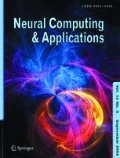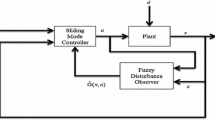Abstract
Aiming at high-speed signal sampling system with internal parameter perturbation and external disturbance, a novel delta operator saturated variable rate reaching law based on sigmoid function is presented, and soft sliding mode controller design is addressed for delta operator systems with uncertainties in the paper. The structural feature of uncertain delta operator system is concerned. Soft sliding mode controller design for continuous-time system and discrete-time system can be converted to the case of delta operator system. The stability of uncertain delta operator soft sliding mode control (SMC) system is guaranteed by Lyapunov stability theory. Soft sliding mode controller design for uncertain delta operator systems is achieved by the proposed reaching law under a certain matching condition. It is illustrated that delta operator soft SMC system by the proposed reaching law in a simulation example can not only reach the scope of the switching plane in limited time, but also reduce system chattering effectively. The system on stability and process steady is better than that of delta operator exponential reaching law and delta operator variable rate reaching law. At the same time, the system has a good completely robustness compared with delta operator statured reaching law.



Similar content being viewed by others
References
Goodwin GC, Middleton RH, Poor HV (1992) High-speed digital signal processing and control. Proc IEEE 80:240–259
Suchomski P (2002) Numerically robust delta-domain solutions to discrete-time Lyapunov equations. Syst Control Lett 47:319–326
Li H, Wu B, Li G, Yang C (2005) Global theory of delta operator control and its robustness control. National Defense Industry Press, Beijing
Chadwick M, Kadirkamanathan V, Billings S (2006) Analysis of fast sampled non-linear systems: generalized frequency response function for delta-operator models. Signal Process 86:3246–3257
Won W, Lee KS (2012) Identification of a multivariable delta operator stochastic state-space model with distributed time delays: application to a rapid thermal processor. Comput Chem Eng 40:223–230
Karimi HR (2012) A sliding mode approach to H ∞ synchronization of master-slave time-delays systems with Markovian jumping parameters and nonlinear uncertainties. J Frankl Inst 349:1480–1496
Mahmoodabadi MJ, Taherkhorsandi M, Bagheri A (2014) Optimal robust sliding mode tracking control of a biped robot based on ingenious multi-objective PSO. Neurocomputing 124:194–209
Wu L, Zheng W, Gao H (2013) Dissipativity-based sliding mode control of switched stochastic systems. IEEE Trans Autom Control 58:785–793
Ma SP, Boukas EK (2009) A singular system approach to robust sliding mode control for uncertain Markov jump systems. Automatica 45:2707–2713
Xing H, Li D, Gao C, Kao Y (2013) Delay-independent sliding mode control for a class of quasi-linear parabolic distributed parameter systems with time-varying delay. J Frankl Inst 350:397–418
Tang Y, Zhang X, Zhang D, Zhao G, Guan X (2013) Fractional order sliding mode controller design for antilock braking systems. Neurocomputing 111:122–130
Wang B, Shi P, Karimi HR (2014) Fuzzy sliding mode control design for a class of disturbed systems. J Frankl Inst 351:3593–3609
Li H, Yu J, Hilton C, Liu H (2013) Adaptive sliding-mode control for nonlinear active suspension vehicle systems using T-S fuzzy approach. IEEE Trans Ind Electron 60:3328–3338
Fei J, Ding H, Yang Y (2014) Robust adaptive neural sliding mode control of MEMS triaxial gyroscope with angular velocity estimation. Neural Comput Applic 24:201–210
Yakut O (2014) Application of intelligent sliding mode control with moving sliding surface for overhead cranes. Neural Comput Appl 24:1369–1379
Liu Y, Zhang C, Gao C (2012) Dynamic soft variable structure control of singular systems. Commu Nonlinear Sci 17:3345–3352
Liu Y, Kao Y, Gu S, Karimi HR (2015) Soft variable structure controller design for singular systems. J Frankl Inst 352:1613–1626
Li H, Gao H, Shi P, Zhao X (2014) Fault-tolerant control of Markovian jump stochastic systems via the augmented sliding mode observer approach. Automatica 50:1825–1834
Yu J, Sun G, Karimi HR (2012) Fault reconstruction based cascaded sliding mode observers for descriptor linear systems. Math Probl Eng 2012:1–20
Gao W, Wang Y, Homaifa A (1995) Discrete-time variable structure control systems. IEEE Trans Ind Electron 42:117–122
Liu T, Liu H, Qu W (2010) Quasi-sliding-mode control based on discrete time-variant reaching law. Control Decis 25:797–800
Sun B, Sun X, Chen L, Xue J (2011) Algorithm of discrete-time sliding mode control based on power-function. Control Decis 26:285–288
Gao C, Liu Z, Ren Q (2013) Nonlinear quasi-sliding-mode robust control for discrete-time systems with time-delay. Control Theory Appl 30:123–130
Liu X, Sun X, Dong W, Yang P (2013) A new discrete-time sliding mode control method based on restricted variable trending law. Acta Automatica Sinica 39:1552–1557
Qiu J, Xia Y, Yang H, Zhang J (2008) Robust stabilization for a class of discrete-time systems with time-varying delays via delta operators. IET Control Theory Appl 2:87–93
Yuan Y, Sun F (2014) Delay-dependent stability criteria for time-varying delay neural networks in the delta domain. Neurocomputing 125:17–21
Gao Y, Shi P, Li H, Nguang SK (2015) Output tracking control for fuzzy delta operator systems with time-varying delays. J Frankl Inst 352:2951–2970
Qin C, Xiang Z, Karimi HR (2015) Robust H ∞ reliable control of delta operator switched systems with time-varying delays under asynchronous switching. T I Meas Control 37:219–229
Qin C, Xiang Z, Karimi HR (2014) Finite-time H ∞ control for switched systems with time-varying delay using delta operator approach. Int J Control Autom Syst 12:1150–1159
Zhou Q, Shao X, Karimi HR, Zhu J (2015) Stability of genetic regulatory networks with time-varying delay: delta operator method. Neurocomputing 149:490–495
Zhang C, Liu Y, Gao C et al (2012) Sliding mode variable structure control for uncertain delta operator system. Control Decis 27:237–242
Yang H, Xia Y, Shi P (2010) Observer-based sliding mode control for a class of discrete systems via delta operator approach. J Frankl Inst 34:1199–1213
Xia Y, Fu M, Yang H, Liu G (2009) Robustness sliding mode control for uncertain time-delay systems based on delta operator. IEEE Trans Ind Electron 56:3646–3655
Yang H (2010) Robust adaptive sliding mode control for uncertain delta operator systems. Int J Adapt Control 24:623–632
Liu Y (2012) Study on variable structure control strategy and its design for singular systems and delta operator systems. Ocean University of China, Qingdao
Liu J (2012) Sliding mode control design and MATLAB simulation. Tsinghua University Press, Beijing
Liu Y, Gu S, Kao Y, Tang S (2015) Soft variable structure controller design for constrained systems based on S-class functions. Neural Comput Applic 26:705–711
Acknowledgments
This paper is partially supported by the National Natural Science Foundation of China under Grants No. 61403283 and 61473097, Shandong Province Higher Educational Science and Technology Program under Grant No. J14LN52, and Weifang City Science and Technology Development Program under Grant No. 2014GX022.
Author information
Authors and Affiliations
Corresponding author
Rights and permissions
About this article
Cite this article
Liu, Y., Kao, Y., Wang, W. et al. Soft sliding mode controller design for uncertain delta operator systems. Neural Comput & Applic 27, 2475–2482 (2016). https://doi.org/10.1007/s00521-015-2018-5
Received:
Accepted:
Published:
Issue Date:
DOI: https://doi.org/10.1007/s00521-015-2018-5




